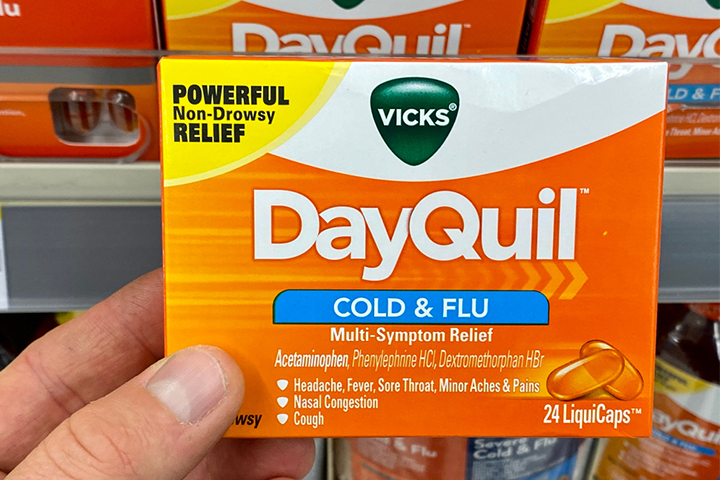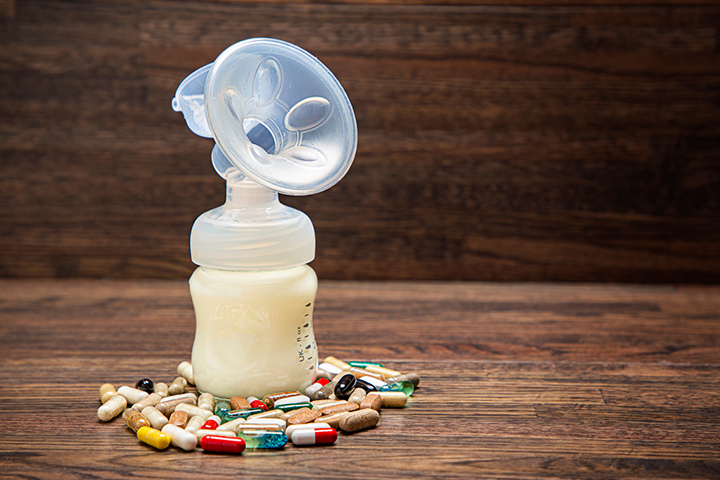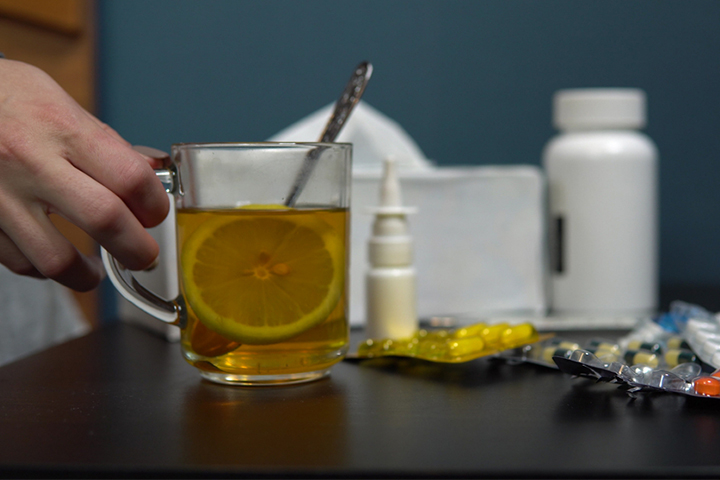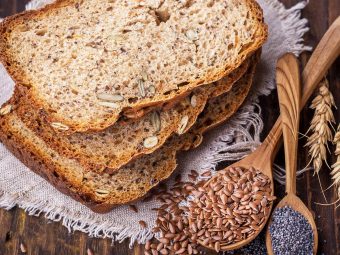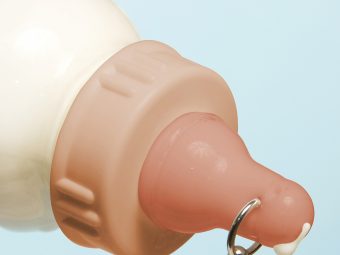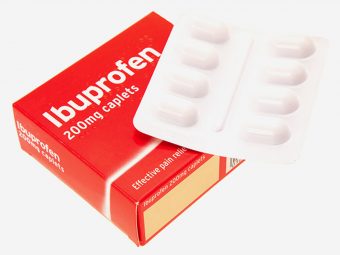
Image: iStock
A nursing mother should be careful of what she consumes, including medicines, since what she eats can reach the baby through breast milk. Certain drugs may not be suitable for babies and have harmful side effects. Many mothers may consider having a nasal decongestant such as phenylephrine while breastfeeding. However, phenylephrine may reduce the supply of breastmilk (1). Therefore, it is strongly recommended to consult with your doctor to avoid any adverse fetal exposure due to the medication.
Read on to know about the effects of phenylephrine during breastfeeding, its safety regarding the baby, and the necessary precautions that you should take.
What Is Phenylephrine?
Image: Shutterstock
Phenylephrine is a type of decongestant. It helps treat nasal congestion or discomfort that occurs due to illnesses such as hay fever, cold, flu, sinusitis, and allergies. The use of phenylephrine doesn’t actually treat the illness. But it helps reduce the inflammation of the nasal blood vessels and thus provides temporary reprieve to the patient.
Phenylephrine is available in many forms such as regular tablets, extended-release pills, liquids, and sprays. It is also added to other medicines (2).
Is It Safe To Take Phenylephrine While Breastfeeding?
Image: IStock
Experts don’t advise using phenylephrine for lactating mothers due to the following reasons:
- Due to the low bioavailability of phenylephrine (oral use), it is considered a low-risk compound. But, oral or intravenous phenylephrine use may lead to lactation suppression. Nasal sprays containing phenylephrine may have a less adverse effect on breast milk (4). If you are a nursing mother with poor production of breast milk, then use drugs containing phenylephrine with caution.
 Point to consider
Point to consider- If you are a nursing mother, it is better to avoid the use of decongestants in any form. They may cause restlessness and irritability in breastfeeding infants. However, there is insufficient evidence to support this study. Other decongestants such as pseudoephedrine pose greater harm to a nursing infant (5). Using any form of decongestants only under the doctor’s guidance helps ensure optimum infant safety without causing any adverse effects of the infant development (3).
Phenylephrine And Breastfeeding – Side Effects
Image: Shutterstock
Some of the common side effects of phenylephrine include (6):
- Insomnia
- Upset stomach
- Dizziness
- Headache
- Nervousness
- Irregular or rapid heartbeat
- Shaking
- Lightheadedness
Medicine Use And Breast Milk Fact Sheet
Image: Shutterstock
If you are a nursing mother, you may find the below information useful (7):
- All drugs can pass into the breastmilk to some degree. But the extent and possible risks may depend on factors such as the type of medicine, levels of drug compounds present in the mother’s body and the dosage of the medicine during breastfeeding.
 Quick tip
Quick tip- Health of the baby is also a factor at risk from drug exposure during breastfeeding. Newborns, preterm babies, and sick infants are at a greater risk from medication exposure through breast milk compared with breastfeeding babies who are a few months older.
- Nursing mothers must not avoid medicines, unless it is necessary. For instance, non-treatment may pose more harm to the mother and the newborn than exposure to certain drugs.
- Scheduling breastfeeding before the medicine dose can minimize your child’s exposure to harmful medicinal compounds.
- Expressing breast milk for your child before your medicinal dose can also lower their risk of drug exposure through breastfeeding.
Treatment Guidelines For Breastfeeding Mothers With Congestion Problems
If you have a cold or congestion problem, you may want to consult your doctor for safe drug use while breastfeeding as well as about continuing to breastfeed your child through your illness. Here are some other options:
Image: Shutterstock
- To treat nasal congestion and other cold symptoms, nursing mothers can try safe natural remedies in lieu of medicines containing phenylephrine. Lemon, honey, ginger, regular intake of warm water throughout the day and some herbal teas can provide relief from nasal congestion. However, consult with your doctor before trying any natural remedies while breastfeeding.
 Quick tip
Quick tip- Adequate rest and extra nourishment in the form of juices, soups, and warming foods may provide some relief from the congestion problem.
- Ask your doctor for alternate drugs for your cold and congestion that you can safely use while breastfeeding. Some nasal decongestants like xylometazoline are considered safer than phenylephrine. If you experience fever or pain along with your cold and nasal congestion, you can take additional medicines for quick relief from your symptoms. For instance, the use of Ibuprofen is considered safe during breastfeeding (8). Oxymetazoline is another nasal decongestant that could be used but is not well-studied for its perceived impact while breastfeeding. Be sure to check with your doctor about its possible side-effects and recommended alternatives.
If you notice any problems in your child after breastfeeding, immediately inform your pediatrician about it. Some drugs, even when considered safe, may harm the nursing child.
It is not necessary to discontinue breastfeeding your child when you are taking medicine. Some medicines are perfectly safe to use for nursing mothers. The important thing is to have relevant information at your disposal about the medicine you are using and its potential risks to your nursing child. Therefore, do not hesitate to consult your doctor about any health problem you experience, even if it is a simple nasal congestion.
Medicinal compounds can easily affect the quality and quantity of your breast milk. The risks to your nursing baby may depend on the type of drug used and the state of his health. Therefore, it is extremely important to carefully consider the use of any medicine while breastfeeding your child, while also taking optimum postpartum care.
Frequently Asked Questions
1. Are pseudoephedrine and phenylephrine the same thing?
Pseudoephedrine and phenylephrine are both decongestants. However, the brand version of phenylephrine is Sudafed PE, whereas, for pseudoephedrine, it is Sudafed. In terms of efficacy, pseudoephedrine is more effective than phenylephrine in alleviation of symptoms (9) (10).
2. How long does phenylephrine stay in our system?
According to a study, the elimination half-life of phenylephrine was found to be 2.5 hours (11).
3. Can phenylephrine interact with other medications commonly used by breastfeeding mothers?
There is not much evidence to suggest that phenylephrine may interact with specific medications while breastfeeding. However, if you are on medications for depression, heart ailments, and epilepsy or have glaucoma or an overactive thyroid gland, its consumption is prohibited (15).
While breastfeeding, you must be wary of what you consume as it eventually passes to your baby through the breastmilk. Phenylephrine while breastfeeding is not advisable as it might cause irritability in the infants and affect the milk supply and quality. If you are suffering from congestion problems, instead of using OTC medications, consult the doctor for safer alternatives and take the help of home remedies to overcome the symptoms.
Infographic: Alternative Treatments For Nasal Congestion While Breastfeeding
Nasal congestion can be bothersome for nursing mothers, making breathing difficult and affecting their ability to nurse effectively. While over-the-counter decongestants are often used to treat nasal congestion, they are not always safe for lactating women. So explore the alternative treatments for nasal congestion that may be safer while breastfeeding. Illustration: Momjunction Design Team
Key Pointers
- Phenylephrine, a decongestant, is used to relieve nasal obstruction caused by allergies or infections.
- Lactating individuals are discouraged from using phenylephrine, as it may negatively affect breast milk supply.
- The use of phenylephrine in nursing mothers can result in adverse effects such as insomnia, dizziness, and headache.
- Before taking the medication, nursing mothers should consult with their doctor and consider safer alternatives to phenylephrine.
References
- Phenylephrine.
https://mothertobaby.org/fact-sheets/phenylephrine/ - Phenylephrine.
https://medlineplus.gov/druginfo/meds/a606008.html - Decongestants.
https://www.nhs.uk/conditions/decongestants/ - Bethesda, (2018). Phenylephrine.
https://www.ncbi.nlm.nih.gov/books/NBK501438/ - Pseudoephedrine.
https://www.ncbi.nlm.nih.gov/books/NBK501085/ - Guaifenesin and phenylephrine.
https://www.mottchildren.org/health-library/d03381a1 - Breastfeeding and drugs.
https://www.qld.gov.au/health/condition/child-health/babies-and-toddlers/breastfeeding-and-drugs - Drugs in breastmilk.
https://health.ucsd.edu/news/features/pages/2014-11-07-otc-drugs-and-breastfeeding.aspx - Joseph A. Woelfel (2005); Sudafed PE nasal decongestant.
https://scholarlycommons.pacific.edu/cgi/viewcontent.cgi?referer=&httpsredir=1&article=1051&context=phs-facarticles - Don’t let decongestants squeeze your heart.
https://www.health.harvard.edu/heart-health/dont-let-decongestants-squeeze-your-heart - Cathy K. Gelotte and Brenda A. Zimmerman (2015); Pharmacokinetics Safety and Cardiovascular Tolerability of Phenylephrine HCl 10 20 and 30 mg After a Single Oral Administration in Healthy Volunteers.
https://www.ncbi.nlm.nih.gov/pmc/articles/PMC4559581/ - Phenylephrine.
https://dailymed.nlm.nih.gov/dailymed/fda/fdaDrugXsl.cfm?setid=c40df8f6-8374-4f9b-bfce-94d582470d48&type=display - Medication Safety Tips for the Breastfeeding Mom.
https://www.healthychildren.org/English/ages-stages/baby/breastfeeding/Pages/Medications-and-Breastfeeding.aspx - Cough and cold remedies and Breastfeeding.
https://www.breastfeedingnetwork.org.uk/factsheet/cold-remedies/ - Phenylephrine
https://www.medsafe.govt.nz/consumers/cmi/CoughandCold/Phenylephrine1.pdf





